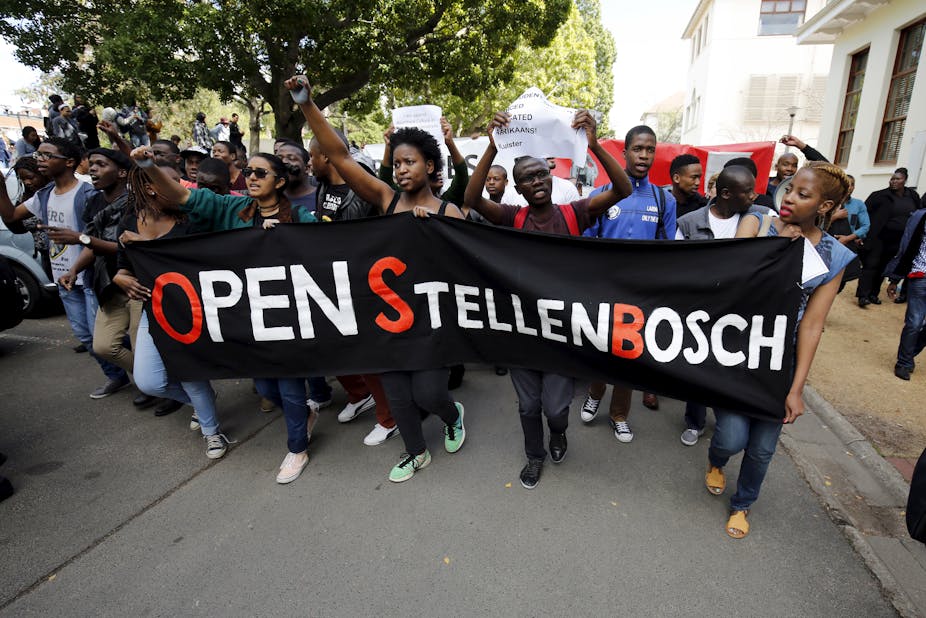Given the disconcerting present, how can we explain our wretched past and understand our increasingly threatening future? This question continued to drift to the surface as I listened recently to presentations about the history of individual departments in Stellenbosch University’s Faculty of Arts and Social Science – the name for the humanities faculty at that university.
Some context is needed: next year Stellenbosch will celebrate its centenary, and a commemorative tome beckons. Some faculties are already busy writing up their pasts. The Arts and Social Science Faculty is first exploring various ways of speaking about it before its starts to write. It is commendable, given the value-laden nature of its disciplines.
Stellenbosch University has a special place in the imaginary of South African higher education. The traditional centre of Afrikaans language and learning, the university is often said to have been the intellectual home of the apartheid system.
Like all other tertiary institutions it has had to grapple with political change, the rise of market ideology, and the impact of technological change.
Key question about the past
The presentations at the seminar were uneven. Presenters – with one notable exception – made little systematic use of the formal university archive. It is perhaps the only place that could answer the key question about the university’s past: Did Stellenbosch make Afrikaner Nationalism, or Afrikaner Nationalism make Stellenbosch?
In seeking to answer this question, most presenters drew from years in the academic trenches. They recalled members of staff, their interests, the numbers of students, changing syllabi, and the like. But others reached beyond this comfort zone to explore how individuals and their subjects were captured by ideology at various stages in the 100-year history of the university.
One offered an account of a schism between colleagues that continued for three decades. Another passionately explained how, from the late-1960s, the Social Sciences and the project of modernity were forced on the university to help align the country with a changing world. Yet another recalled an earlier war had been fought in the bowels of the faculty over the language of instruction – this time in the 1920s over whether it should be Dutch or Afrikaans.
The current language war raging at the university is over the continued use of Afrikaans – considered by many, still, as the tongue of apartheid – as one of the languages of instruction.
Bohemian lifestyles
Scattered through these accounts were stories of difference, even deviance. There were the bohemian lifestyles of members of the faculty in the 1960s. Then in the 1970s classical composers who began to incorporate African themes in their music. In the 1980s there was the authentic student rebellion that drew on rock music – and drugs – to shake up the university and its ruling establishment. This provoked an often ruthless response from a university leadership invoking God, the Afrikaner cause and the then ruling National Party.
But this was not the only disciplining force. The omnipresent English, active in colonial rule and at other universities in the country, invariably exercised their seemingly God-given claim to superiority – in respect of race, the role of Empire, and on why knowledge rightfully belonged to them.
The two days of reflection showed again just how is difficult it is to speak about these things, even in a place whose work is to deal with ideas, and how ideas make – and are made by – the world.
But we all know, or should all know, that knowledge is a fickle mistress. Academic fashions change despite the timelessness promised by the idea of an established canon. This is why, before anything else, academics should be teaching their students that people change their minds if they think about things. Only people who don’t think don’t change their minds.
Déjà vu
Midway through the event, I remembered that I had been in this exact space once before. Weeks after the Berlin Wall had come down, I visited a faculty in its Eastern sector of that German city. A well-known professor in the Humanities received me in his cavernous office on Unter den Linden. He was fearful rather than confident about the future of scholarship at the university in a unified Germany in a post-Cold War world.
Significantly, in the course of talking about past scholarship at their faculty, the colleagues at Stellenbosch displayed an even more deep-seated concern about its future. Even if we understand that what what we know is forged by passion, partisanship and politics, to pretend that there is objectivity in the Humanities is to call forth the Russian saying that
he lied like an eyewitness.
Unlike the natural sciences, where measurement and mathematics have become proxies for the truth, every intellectual past in the humanities has to be looked straight in the eye, and its ideological underpinnings unravelled.
This is where the campaign to decolonise knowledge has pulled the Humanities up short, not only in South Africa but throughout the world. At the heart of the issue, surely, is the Foucaultian idea of social power. How this is exercised both within the university and the world it always hopes to make?
As a result, are faculty histories to be like South Africa’s Truth and Reconciliation Commission: a transactional zone where confessions are traded for forgiveness? Or should they ideally provide an understanding of the past because it has a bearing on the present and the future?
If the latter, we should all be reading Alexis de Tocqueville, who wrote that his attempt to understand the French Revolution was
less about the facts … [than it was looking for] … traces of the movement of ideas and sentiments … [because] … the difficulties … [of understanding] … are immense …
The Stellenbosch exercise is a brave initiative spearheaded by a dean. It comes with a quiet confidence in his insight that only conversation can shed light on our conflicted past, and build understanding in an age of great uncertainty about our future.

